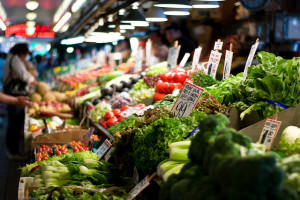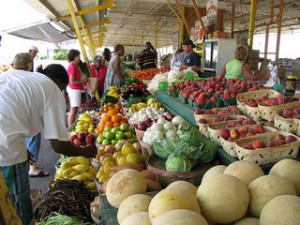Farmers’ Markets as a Means of Education and Community Growth
The growth of the farmers’ market as a source of education about the industrial food system and a means to unite a community.
By: Jackie Marchildon, Staff Writer
Over the last 5 years, farmers’ market locations have increased significantly throughout the GTA, and although there may be different reasons for their expansion, some farmers’ market founders point to community outreach at the forefront of their development. Although the increase in markets shows promise for the local food movement, some caution that there is still more that needs to be done other than just opening new markets in populated neighbourhoods.
“As a destination market, food is an important pillar among many of the experiences here on Saturdays,” says Anthony Westenberg, from environmental charity Evergreen, of their market Brick Works. Westenberg also adds that Evergreen Brick Works Farmer’s Market generated $3.9 million for the local food economy in 2012, and so he points out that the local food shed economy for farmers across Ontario via the Farmers’ Market must in the multi-millions.
Farmers’ markets, like Dufferin Grove and Riverdale, have been around for years, but it’s only recently that markets have increased among varied communities. In 2008, Lesley Stoyan, co-founder of Appletree Markets, was asked to participate in a community initiative to get locals involved with Earth Day in north Toronto. Stoyan explained that Evergreen’s Brick Works market had recently opened, but markets were not very vibrant within the city, so with her husband, she set up a farmers’ market for the initiative. The community loved it, so instead of being a onetime event, the market stuck around and continued to expand. They even opened their second location last year.
Although the community reacted well to the market, Appletree still faced challenges in Toronto’s fast-paced shopping atmosphere. “Educating the public about why you want to really pay attention to where your dollar is going as far as local sustainable food purchasing, has been quite a challenge,” Stoyan explained sincerely. “So that’s been something that we really had to get our head around, really specific market demographic, a really specific marketing campaign for this neighbourhood, so that’s definitely been an obstacle for sure.”
[pullquote]So I think it’s great that there’s been this boom in farmers’ markets, it allows communities to come together with this food hub, they can eat, shop and socialize.[/pullquote]
Despite the challenges faced in getting people excited and involved in local eating, farmers’ market founders agree that more people have opted to shop at farmers’ markets and the accessibility in certain areas has really improved, especially in Toronto.
Stoyan attributes the recent increase to the local food movement. “The local food movement has really become, in my opinion, what the organic food movement was a decade ago.” Stoyan explains that people are now less concerned with organic, as she thinks they are now more interested in making sure they are keeping their food local, “and that’s fantastic. So I think it’s great that there’s been this boom in farmers’ markets, it allows communities to come together with this food hub, they can eat, shop and socialize.”
Diana Gonzalez, Toronto District Supervisor for MyMarket, agrees there are more and more markets popping up around the city. “I think every community would like to have their own green initiatives and many think that opening farmers’ markets is the way to do it, and there are also people that really want them.”
MyMarket is the Certified Local Farmers’ Market brand that was introduced in May 2007 to ensure that farmers are screened and truly local. Although cities take permit fees and smaller markets sometimes charge a vendor’s fee, funds brought in by farmers’ produce go directly to the farmer.
According to Stoyan, large chains are beginning to change their practices because they understand people are caring more about where their foods are coming from. “Farmers’ markets will be a threat to the bigger grocery stores if people start avoiding shopping at Loblaws, Costco, that sort of thing.” On top of that, markets are great for the city, as they reach out to people, put parks to use and boost city morale as well as impact the tourist economy.
[pullquote]The idea of the local food movement is to educate the co-producer around the consequences of an industrial food system. And so, farmers’ markets are one of the components that brings people together.[/pullquote]
Marina Queriolo, manager of Evergreen Brick Works Farmers’ Market, advises that people want to support local economy and now understand the implication of bad food choices. Queriolo says that people aren’t finding what they need from mainstream sources and so they are turning to farmers’ markets where they can talk to vendors and build a relationship.
“The idea of the local food movement is to educate the co-producer [people buying at markets] around the consequences of an industrial food system. And so, farmers’ markets are one of the components that brings people together, that connects them to food, and it’s an easy way, it’s not something that you have to do a lot of homework for, you just show up to the market and somebody has done the screening for you,” Queriolo explains. “There is an understanding that if you choose the right market, that it is local farmer, the practices are sustainable … it’s a good place to find food without being intimidated.”
Queriolo agrees that certain areas in the city could improve their food access and there are opportunities for them to develop new farmers’ markets, but she made a strong point in saying that, “we need to ensure that the farmers that are coming to the city are really making enough money for them to come here. So it’s a difficult balance in saying yes, let’s have more farmers’ markets because that makes more producers in contact with the co-producers (customers), but we need to make sure it makes financial sense for the farmers to be driving this distance to get to the market.”
“What I think needs to happen now, is that we need to be strategic about what farmers’ markets are growing in the city and where we need to expand markets,” Queriolo explains, “there’s still a disconnect in small towns about the value of food.”
Jackie Marchildon recently graduated with her degree in journalism from Ryerson University. After spending a semester abroad, Jackie has avid travel plans and enjoys writing about almost everything, from human rights issues to arts and entertainment. For examples of her recent pieces, visit: http://www.linkedin.com/pub/jackie-marchildon/59/b84/131.
Photograph Courtesy of Robert S. Donovan
Photograph Courtesy of Natalie Maynor

































Share the post "Farmers’ Markets as a Means of Education and Community Growth"